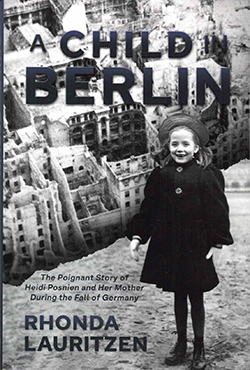A Child in Berlin by Rhonda Lauritzen; New York: Post Hill Press; © 2024; ISBN 9798888-452089; 232 pages plus appendices; $18.99.

 SAN DIEGO – You might call this biography an introduction to another side of World War II. It’s not a Holocaust memoir, so many of which have been and will continue to be reviewed in this publication. Neither is it the story of Jewish partisans desperately combatting Nazi forces.
SAN DIEGO – You might call this biography an introduction to another side of World War II. It’s not a Holocaust memoir, so many of which have been and will continue to be reviewed in this publication. Neither is it the story of Jewish partisans desperately combatting Nazi forces.
This, as the title suggests, is the story of Heidi, a little Catholic girl born in 1936 who grew up in Berlin and the nearby countryside during the Hitler regime that culminated in Germany’s utter defeat in World War II. Heidi’s mother, Käthe, a blonde, blue-eyed beauty who loved to sing, had been awarded a role in the state opera house of Berlin, which prompted their move to Germany’s capital city from the countryside.
Käthe thought the coveted position was a reward for her talent but became disillusioned when she realized that she had taken the spot previously occupied by a Nazi-spurned Jewish singer. Disheartened that her good fortune was based on another’s misfortune, Käthe quit the opera and, needing to provide for herself and her daughter, turned to securing and selling food supplies on the black market.
To be kept safe, Heidi, from the age of 3 to 9, was sent back and forth from her mother’s apartment to a variety of living arrangements outside the city. She learned to be alone, to not be afraid of the dark, and most important of all to be resourceful.
During a particularly cold winter, Käthe blocked off a room in their Berlin apartment so as not to have to heat it. Heidi, pushing back the barricade, was startled to find an emaciated man in a striped uniform sitting almost paralyzed in a chair – the first time Heidi realized that her mother had been hiding a Jewish escapee from the Sachsenhausen concentration camp, located about 30 miles away.
Sometime later, Gestapo agents took the man and Heidi’s mother away, and the 9-year-old Heidi had to fend for herself as Russian troops approached Berlin from the east and American troops made slower progress from the west.
Author Lauritzen narrates Heidi’s story with straightforwardness, capturing the little girl’s games, friendships, deprivations, innocence, and resourcefulness, as well as the love with which Käthe risked her life while sheltering Heidi’s.
This biography captures the horrors of war and its transforming impact on some of civilian adults and children.
*
Donald H. Harrison is publisher and editor of San Diego Jewish World.
This sounds like a really interesting read. Thank you for reviewing a book from this unique perspective.
Thank you for this review, Mr. Harrison,
As a person who has been obsessed with WWII and Holocaust stories since the age of 11 years old, I am pleasantly surprised to now know of this book! I hope to find a copy at my local library.